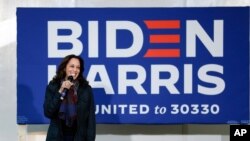Kamala Harris, the vice-presidential running mate of Democratic presidential candidate Joe Biden, parlayed a career as a California prosecutor, attorney general and U.S. senator to the cusp of the second most powerful job in the country.
Harris, the first African American woman and first Asian American to be a major party’s vice-presidential nominee, said during the Democratic National Convention in August that she and Biden share a “vision of our nation as a beloved community – where all are welcome, no matter what we look like, where we come from, or who we love.”
The Biden-Harris ticket was forged despite sharp differences between the two during the Democratic party’s presidential primary election season in debating race relations, busing and Biden’s civil rights record as a U.S. senator from Delaware. In accepting her party’s vice-presidential nomination after ending her own presidential campaign, Harris asked Americans to join her in fighting racism and xenophobia. “There is no vaccine for racism. We’ve got to do the work,” she said.
Yet the ensuing presidential campaign has been bruising at times for a Black woman seeking to make political history on Tuesday. President Donald Trump referred to Harris as “this monster” in an interview in early October, the morning after Harris and Republican Vice President Mike Pence squared off in a nationally televised debate.
Harris refused to respond besides dismissing the president’s comment as “childish,” but it was emblematic of racial and gender barriers that she has had to contend with throughout her political career, according to her allies and minority advocacy groups. Biden responded, calling Trump’s comments “despicable” and “so beneath the office of the presidency.”
Harris introduced herself at the Democratic convention as the daughter of Indian and Jamaican immigrants. She pledged to work to make America more inclusive after four years of the Trump administration, which she described as making the country more divided.
Since late summer, Harris has spent her time crisscrossing the country to campaign for Biden in their quest to unseat Trump and Pence. At a campaign stop in Reno, Nevada, in late October, she urged people to vote and "fight for the promise of America."
Debate stage
Harris was not always on the same page as former Vice President Biden. Before becoming Biden’s running mate, Harris was herself seeking the Democratic presidential nomination.
One of the most dramatic moments of the nominating contest came on a debate stage in June 2019, when Harris directly challenged Biden, one of the party's long-standing leaders, about his views on America’s often-troubled race relations - and his prior work in the U.S. Senate with lawmakers with a segregationist past.
With measured precision, Harris told Biden, two decades her elder, "It was hurtful to hear you talk about the reputations of two United States senators who built their reputations and career on the segregation of race in this country. And it was not only that, but you also worked with them to oppose busing.
"You know, there was a little girl in California who was part of the second class to integrate her public schools," Harris continued, "and she was bused to school every day. And that little girl was me."
Biden was stunned by the attack and protested that he was only opposed to forced busing mandated by the federal government — although he had often worked as a senator himself in the 1970s and 1980s to oppose school busing to racially desegregate schools. But he later apologized for his comments about his working relationships with Southern lawmakers with a checkered history on racial equality.
Now, whatever animosity might have been generated more than a year ago on the debate stage has dissipated. After a lengthy search for a vice presidential running mate, Biden picked the 56-year-old Harris less than three months before the November 3 national election.
Breaking barriers
Biden's selection of Harris was history-making. Harris is the fourth woman to be on a major party national ticket, but the first African American woman and first Asian American.
The three women previously on U.S. national political tickets – two vice presidential candidates and Democratic presidential candidate Hillary Clinton in 2016 – all lost. If the Biden-Harris ticket wins, Harris would become the highest-ranking female U.S. official in the country's 244-year history.
U.S. political analysts are assuming Biden, who would be 78 if he wins and is inaugurated in January 2021, might only serve a single four-year term, instantly making Harris a leading 2024 Democratic presidential contender.
Harris' scripted 2019 debate stage encounter with Biden was perhaps the high point of her run for the Democratic presidential nomination. Soon after, her standing in national political surveys edged higher in the crowded field of candidates.
But she couldn't sustain the momentum and, lacking funds to continue the campaign, dropped out of the contest in December 2019. Her departure came more than a month before the first nominating contest in Iowa in early 2020.
Political observers say Harris had struggled to define her candidacy, sometimes telling voters their concerns merited further thought on her part but offering no immediate answers.
Political views
Harris holds reliably left-of-center views on promoting access to health care in the U.S., banning assault weapons, granting a path to citizenship for undocumented immigrants and ensuring workplace equality for women and gay people.
But the progressive wing of the U.S. Democratic Party questioned her background as a tough prosecutor in San Francisco and later as California attorney general before winning a Senate seat in 2016.
At one point, she declared, "If you carry an illegal gun in the city of San Francisco and your case is brought to my office, you are going to spend time in jail. Period." Another time, she said, "It is not progressive to be soft on crime."
Yet to some, she has seemed to be a political contradiction, saying she would not seek the death penalty for capital punishment crimes in California, yet defending the state's death penalty when the statute was challenged.
Even so, she has brought a new political energy to Biden's run for the presidency, his third over a three-decade span, but the first time as the party's nominee.
Confronting power
As a member of the Senate Judiciary Committee, Harris has sparred with Trump administration officials and received media attention for her pointed questions of two of the president’s conservative Supreme Court nominees, Neil Gorsuch and Brett Kavanaugh.
During October hearings for a third conservative Supreme Court nominee, Amy Coney Barrett, Harris was more restrained in her questioning at a time when she was both a senator and the vice-presidential nominee.
Harris voted against all three of the conservative nominees, as did most Democrats, although all were confirmed by the Senate to lifetime appointments to the country's highest court.
Harris is also remembered for sharply questioning Attorney General William Barr in May 2019, asking him, "Has the president or anyone at the White House ever asked or suggested that you open an investigation of anyone? Yes or no, please, sir." Barr had no immediate answer and she subsequently called for his resignation, to no avail.
Trump called her questioning of Barr "nasty," a descriptor he employed again after Biden announced his decision to select Harris as running mate. Trump, who donated to Harris's California campaign for state attorney general several years ago, also called her the "meanest" and "most horrible" and said she had been "disrespectful" to Biden in her 2019 debate stage attacks.
Harris has worked on politically bipartisan pieces of legislation with Republicans. Republican Senator Lindsey Graham of South Carolina, a Trump supporter, said of Harris: "She's hard-nosed. She's smart. She's tough."
Harris says she has limits when pursuing legislation grounded in ideology, telling the New York Times a year ago: "Policy has to be relevant. That's my guiding principle: Is it relevant? Not, ‘Is it a beautiful sonnet?'"
Harris and Biden first got to know each other several years ago. Harris worked closely with Biden's son, Beau Biden, on issues when the younger Biden and Harris both served as state attorneys general. Beau Biden died of brain cancer at age 46 in May 2015.
Harris said she was honored to join the senior Biden on the national Democratic ticket, saying on Twitter, "Joe Biden can unify the American people because he's spent his life fighting for us."
Megan Duzor contributed to this report.








